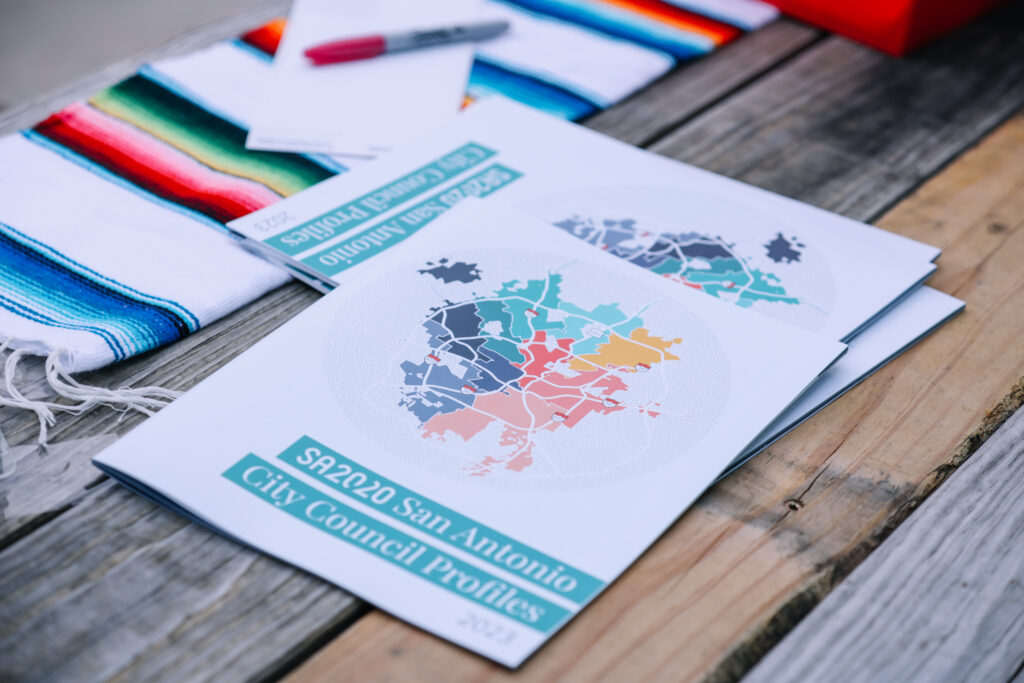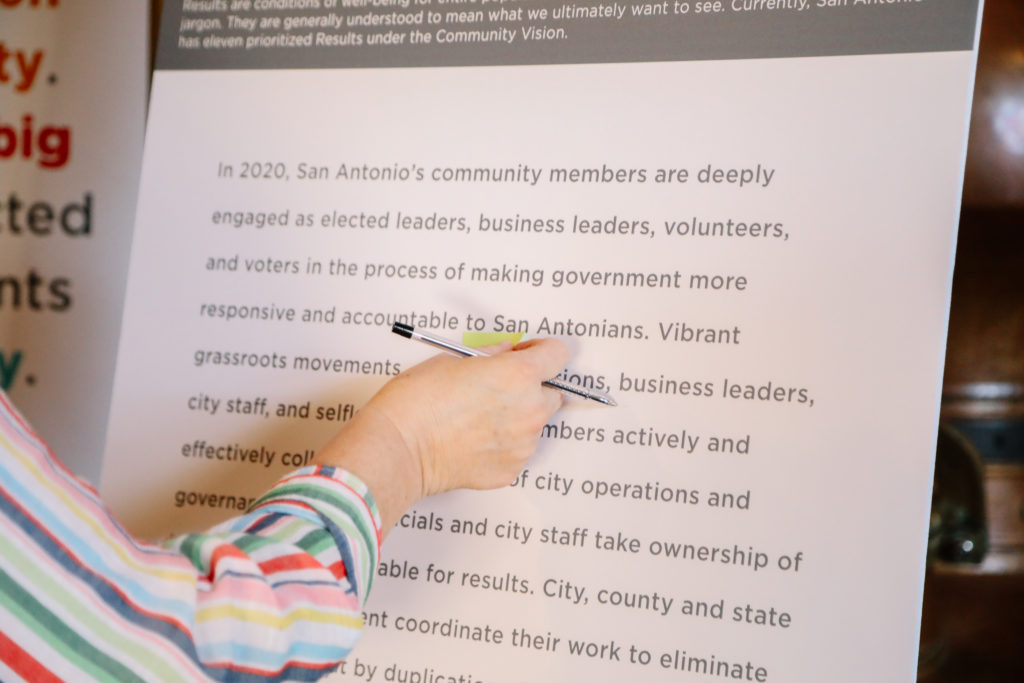Friends and Partners,
Earlier this week the Express-News published a story by Molly Smith about the City of San Antonio defunding SA2020. While our team did not take this story to Molly, I chose to speak candidly and uphold SA2020’s values of community, leadership, and accountability. In that same spirit, I want to reinforce a few messages with folks who have long followed and supported SA2020’s work.
Nonprofit funding is a power struggle. The City has been SA2020’s longest-standing funder, investing just over $1.5 million from 2014 – 2022. For most of these years, SA2020 has recognized that our financial sustainability cannot rely on the same public institutions that we hold accountable to San Antonio’s shared community vision. This investment, however, did not just sustain our nonprofit, it reinforced the City’s commitment to the shared vision.

SA2020 submitted a proposal to the City for 2024 funding because a) our funding model still requires institutional support and changing that while changing leadership and surviving a pandemic will take time, and b) the contract afforded us time with people in positions of power over City policies and services, which is critical to our mission of driving progress. This includes monthly meetings with the City Manager’s Office, and regular communication across departments to identify areas for greater alignment to shared goals, presentations on the latest data to Mayor and Council, and collaboration on key initiatives and goal-setting processes. In 2020 and 2021, ten City departments, including the City Manager’s Office, provided input on the 2030 shared goals.
We are far more concerned about the City’s commitment to the 2030 shared goals embodied in the community vision than the City reinstating SA2020’s funding. While we have a lot of work ahead of us to change our funding model completely, in just the past three years, we have diversified our funding by increasing mission-aligned fees for service, working one-on-one with organizations on community engagement, data analysis, communications, and strategic planning to strengthen their impact. In 2021 and 2022, our fees for service have made up, on average, 32.5% of our annual budget.
In the absence of institutional power, community-based organizations like SA2020 rely on their integrity, excellence, and trusted relationships. I refuse to allow the City of San Antonio to attack SA2020’s value. SA2020’s track record of facilitating meaningful community engagement, reporting on data, and sharing complete stories of San Antonio’s progress is undeniable.
I believe City leadership knows this, contrary to their comments in the Express-News. Just last year, I received a letter from the Assistant City Manager that he was recommending a $150,000 grant to SA2020 be included in the 2023 budget. He specifically applauded the value of our work: “My recommendation is based upon the review and evaluation of previous agreements, deliverables, and SA2020 performance metrics. The City of San Antonio recognizes the value of your research and tracking of Community Indicators and is committed to continuing to provide data required for City-sourced indicators and City Council profiles.”
To be sure, nonprofits funded by the City are put on “corrective action plans” when they don’t meet the performance metrics in their contract. While we disagree with this punitive approach to nonprofit funding, in 10 years of being funded by the City, submitting monthly performance reports and meeting monthly with the City Manager’s Office, SA2020 has never been put on a “corrective action plan.”

SA2020’s excellence has been recognized nationally, and we take immense pride in representing San Antonio when cities, embarking on their own community visioning processes, reach out to us for guidance. In recent years alone, San Antonio’s shared community vision and SA2020’s digital data dashboard have been profiled by the Brookings Institution and the American Institutes of Research. In 2021, SA2020 received the American Civic Collaboration (“Civvys”) Award after being nominated by Mayor Nirenberg. The Civvys are the only national award dedicated to exemplary cases of collaboration, impact, and scalability from which other cities can learn.
The data SA2020 tracks is specifically valuable for achieving shared community goals and helping institutions see where they can better align their own budgets, policies, and work. SA2020’s digital data dashboards track 51 community indicators—data about the well-being of San Antonians—and show the progress toward the 2030 shared goals. The community indicators were prioritized by thousands of San Antonians during the yearlong visioning process in 2020. This built on the work of the previous decade and the original visioning process of 2010.

The City’s draft 2024 budget includes hiring a new position to, in part, “report on key SA2020 metrics” and, as indicated in a letter sent to me on August 10 from the Assistant City Manager, the City seeks to independently identify which metrics to track using its own community engagement efforts.
To be sure, the City can and should lead meaningful public engagement and define its own organizational performance metrics for success. But City-led community engagement solicits input on the City’s own policies and services; it cannot replace a community-wide visioning process that co-creates shared goals achievable only by institutions working collaboratively. For the City to pick and choose which community indicators to track dismisses the yearlong community visioning processes, drives distrust with the public, and shows a lack of understanding of the power of measuring progress toward a shared vision.
As Gilbert Garcia wrote in a follow-up column in the Express-News yesterday, “SA2020 is uniquely positioned to not only collect detailed metrics but to assess our progress toward meeting community goals.”
SA2020’s work includes elevating what data prioritized by the community should be tracked in the first place. SA2020 relies on 29 data sources. We use local sources wherever possible because local data is often the most specific and informative for meeting the needs of the community. Today, of the 10 community indicators the City could source, 4 remain “in development.” Prioritizing the data for these indicators is one way the City can show a serious commitment to the 2030 shared goals. (You can explore these on our digital data dashboard or download a PDF.)
We will continue to hold public institutions, including the City of San Antonio, accountable to the shared community vision defined by San Antonians. The City’s decade-long investment in SA2020 has helped reinforce the City’s commitment to the shared vision. In the absence of a contract with SA2020, how will the City align its investments and services to the 2030 shared goals? Our single most urgent priority is for the City to articulate this plan. This is, after all, the mission of the City of San Antonio—to deliver quality services and commit to achieving a vision of prosperity.
Just like San Antonio’s community vision, SA2020 has always been people powered. We ask that you continue to support SA2020 in transparently reporting on San Antonio’s progress, holding institutions accountable to shared goals, and ensuring the sustainability of our organization.
– Kiran

